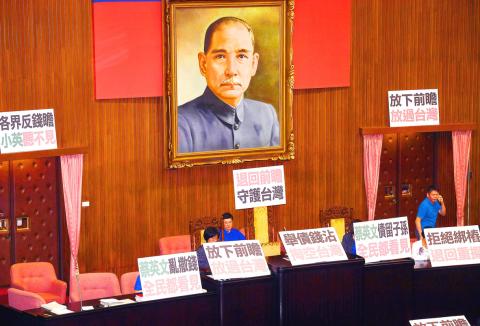The review of a draft act on the government’s Forward-looking Infrastructure Development Program was yesterday stalled as a plenary legislative session saw extended debates with opposition parties demanding that the bill be re-examined.
A cross-caucus negotiation was called immediately after the plenary session began, and the New Power Party (NPP) demanded that the draft act be returned to a legislative committee for reconsideration and that Premier Lin Chuan (林全) and the Cabinet formally report on the infrastructure program to the Legislative Yuan.
The requests were seconded by the Chinese Nationalist Party (KMT) and the People First Party (PFP).

Photo: CNA
NPP Executive Chairman Huang Kuo-chang (黃國昌) said that a formal report by the premier is necessary because it is the Cabinet that should answer for the costly projects, not the ruling Democratic Progressive Party.
The KMT caucus demanded that a feasibility assessment of all the projects be completed before a legislative review.
The DPP refused to return the bill for another round of committee discussions, as it plans to have the bill passed before the end of the extraordinary session tomorrow.
Following hours of cross-caucus negotiations, Legislative Speaker Su Jia-chyuan (蘇嘉全), in an unprecedented move, approved a question-and-answer session for today’s cross-caucus negotiations.
During the session, party caucuses would be able to pose questions to the Cabinet before a clause-by-clause review of the draft act.
The negotiations are scheduled to start at 8:30am, with the NPP, the PFP and the KMT taking turns to question ministers over the program.
“There will still be room for negotiation and ministers would be present at the negotiation for questioning for first time in history,” Su said.
The measure is to make up for the lack of a full legislative debate of the draft act, because it received a committee review on May 15 without its details being debated as the DPP had the bill read out while the KMT caucus was seeking to disrupt the proceedings.
“The draft forward-looking act is not unmodifiable, and changes can be made in terms of construction projects and budgeting,” DPP caucus chief executive Yeh Yi-chin (葉宜津) said.
Meanwhile, during yesterday’s negotiations, KMT legislators occupied the podium in the afternoon to pre-empt the resumption of the legislative session.
KMT Legislator Lin Wei-chou (林為洲) said that the caucus “had their sleeping bags ready” for an overnight occupation of the main chamber of the Legislative Yuan to stall the review of the draft.
Su criticized the KMT caucus, saying the party had broken a cross-caucus agreement of abiding by meeting procedures.
“Who can still believe in the KMT’s honesty? You [the KMT] should swallow your words and apologize to the public,” Su said.

‘FORM OF PROTEST’: The German Institute Taipei said it was ‘shocked’ to see Nazi symbolism used in connection with political aims as it condemned the incident Sung Chien-liang (宋建樑), who led efforts to recall Democratic Progressive Party (DPP) Legislator Lee Kun-cheng (李坤城), was released on bail of NT$80,000 yesterday amid an outcry over a Nazi armband he wore to questioning the night before. Sung arrived at the New Taipei City District Prosecutors’ Office for questioning in a recall petition forgery case on Tuesday night wearing a red armband bearing a swastika, carrying a copy of Adolf Hitler’s Mein Kampf and giving a Nazi salute. Sung left the building at 1:15am without the armband and apparently covering the book with a coat. This is a serious international scandal and Chinese

A US Marine Corps regiment equipped with Naval Strike Missiles (NSM) is set to participate in the upcoming Balikatan 25 exercise in the Luzon Strait, marking the system’s first-ever deployment in the Philippines. US and Philippine officials have separately confirmed that the Navy Marine Expeditionary Ship Interdiction System (NMESIS) — the mobile launch platform for the Naval Strike Missile — would take part in the joint exercise. The missiles are being deployed to “a strategic first island chain chokepoint” in the waters between Taiwan proper and the Philippines, US-based Naval News reported. “The Luzon Strait and Bashi Channel represent a critical access

COUNTERINTELLIGENCE TRAINING: The ministry said 87.5 percent of the apprehended Chinese agents were reported by service members they tried to lure into becoming spies Taiwanese organized crime, illegal money lenders, temples and civic groups are complicit in Beijing’s infiltration of the armed forces, the Ministry of National Defense (MND) said in a report yesterday. Retired service members who had been turned to Beijing’s cause mainly relied on those channels to infiltrate the Taiwanese military, according to the report to be submitted to lawmakers ahead of tomorrow’s hearing on Chinese espionage in the military. Chinese intelligence typically used blackmail, Internet-based communications, bribery or debts to loan sharks to leverage active service personnel to do its bidding, it said. China’s main goals are to collect intelligence, and develop a

PERSONAL DATA: The implicated KMT members allegedly compiled their petitions by copying names from party lists without the consent of the people concerned Judicial authorities searched six locations yesterday and questioned six people, including one elderly Chinese Nationalist Party (KMT) member and five KMT Youth League associates, about alleged signature forgery and fraud relating to their recall efforts against two Democratic Progressive Party (DPP) legislators. After launching a probe into alleged signature forgery and related fraud in the KMT’s recall effort, prosecutors received a number of complaints, including about one petition that had 1,748 signatures of voters whose family members said they had already passed away, and also voters who said they did not approve the use of their name, Taipei Deputy Chief Prosecutor